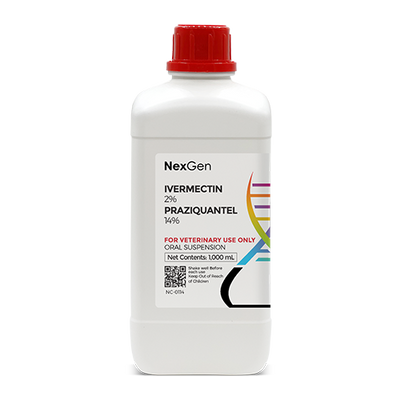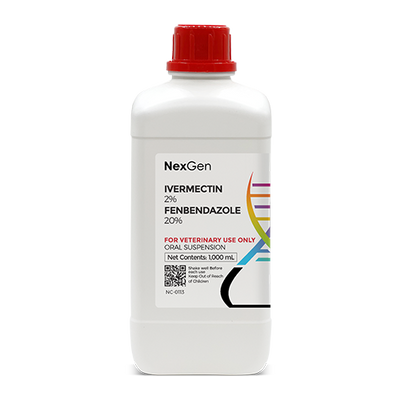
Fenbendazole 20% + Praziquantel 14%, Oral Suspension, 500mL
Login for pricing
- Brand
- Mixlab
- SKU:
- NC-0533
- Product Type:
- Suspension
- Size:
- 500ml
- Administration:
- Oral
- Therapeutic Class:
- Antiparasitic
Horses can endure small numbers of parasitic worms without developing clinical signs of disease. In fact, parasitic worms do live in the intestines of most horses. Larger infestations of worms can cause a wide range of problems, however. Proper pasture management and medications can assist the horse's immune system in keeping the intestinal population of worms in manageable proportions. In serious cases, worms can damage a horse’s intestines and other internal organs, causing irreversible harm with potentially fatal consequences.
In most cases of infection, worm eggs are ingested by a horse from an infected pasture and develop inside the digestive tract or lungs, where they can cause disease. Eggs produced by adult worms are then shed in the horse’s feces where they can potentially infect other horses.1
Common signs of clinical infection in horses can include:
- Loss of weight
- Lethargy
- Loss of condition
- Diarrhea
- Colic
- Lack of appetite
- Dull coat
Fenbendazole for Equines
In horses, fenbendazole is labeled for removal of the following parasites: large strongyles (Strongylus edentatus, S equinus, S vulgaris, Triodontophorus spp), small strongyles (Cyathostomum spp, Cylicocyclus spp, Cylicostephanus spp, Cylicodontophorus spp), ascarids (Parascaris equorum) and pinworms (Oxyuris equi). Benzimidazole resistance has been noted in Cyathostomum spp found in the United States.3
If an animal shows signs of an allergic reaction (facial swelling, itchiness, hives, diarrhea, seizures, or shock), veterinary care should be sought immediately.
Where to buy Fenbendazole + Praziquantel
Fenbendazole + Praziquantel + Pyrantel Pamoate is available in the U.S. through veterinary custom compounding companies.
This product carries numerous potential drug interactions. Please consult your veterinarian prior to beginning any treatment regimen.
FOR RX ONLY: A valid prescription from a licensed veterinarian is required for dispensing this medication.
2Plumb’s Veterinary Drugs.
3Mason ME, Voris ND, Ortis HA, Geeding AA, Kaplan RM. Comparison of a single dose of moxidectin and a five-day course of fenbendazole to reduce and suppress cyathostomin fecal egg counts in a herd of embryo transfer-recipient mares. J Am Vet Med Assoc. 2014;245(8):944-951.




















